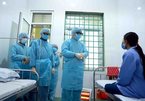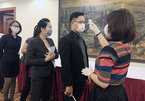Vietnam’s proximity to the epicentre means it could be more likely to suffer from the dreaded nCoV. The country and its capital are now well connected, with many tourists coming to and from China, as well as flights transiting through the northern neighbour. Most of the time, such interconnectivity is a boon for the economy, but the first few days after the Tet (Lunar New Year) holiday were plunged into panic thanks to reports coming out of Wuhan.
Masks are already a common sight around the big cities, and as more strict measures are taken to combat the coronavirus, such as closing tourist sites and cancelling festivals, the impact on businesses and residents will only amplify.
So far, most of the deaths from the virus have been confined to China – the point of origin. However, coronavirus provides rich sustenance for the news cycle and the constant reports can exaggerate the actual risks, leading some to live in fear when it is not warranted.
The highly contagious nature of coronavirus, like SARS and MERS, mean that easily adopted precautions are wise.
Expats in this part of the world can sometimes feel more strongly, as they are far from their homes and loved ones. The virus, whether panic-inducing or not, will cast a shadow on the lives of those in major Asian cities for months to come. It will affect the work, leisure and daily lives of Vietnamese and foreigners alike.
Kamila Harasimowicz, a fashion designer in Hanoi, was not yet too concerned.
“The virus is serious as it will take some time to develop a vaccine, but the statistics show that the people who have caught the virus have been in contact with the area affected.
“We haven’t made any drastic changes to our routines and didn’t travel out over Tet, so we wouldn’t have been directly exposed to a risk as much as some other people,” she said.
“We maintain our strict hygiene routines and follow the guidelines provided by the World Health Organisation, like washing hands, covering mouths when sneezing as always, using hand sanitiser on occasion and cooking our food well.”
At this point, teachers are some of the most affected due to widespread school closures. Directly following the Tết break, teachers and students are enjoying an extended holiday, but there are worries that spending too long away from class could be detrimental to children’s education and the incomes of educational institutions.
Gary Duckett, a business owner in the capital city, echoed those concerns.
“[I’m] not worried personally, but my wife is. My wife has bought masks for the family. [I have] not changed my routine, still at the bia hơi daily! However, now schools are closed, English teachers will have less money, affecting business.”
Josh Stewart, one of Hanoi’s English teachers, was also not overly concerned about the outbreak, but like many he lives in shared accommodation, so the likelihood of transmission increases.
“[I have] no worries as of yet. The infection rate is too low. However, I have bought some extra masks,” he said.
“Everyone who has died has had pre-existing conditions, so until it gets any worse, I'm just taking extra precautions – washing hands and using sanitiser. There was a run on hand sanitiser, so we have made our own using rubbing alcohol. More for peace of mind but living in a shared house allows for these things to slip through. Schools have been cancelled so I'm off work but other than that my routine is the same.”
For many, life goes on despite the coronavirus and teachers these days have the option to move their classes online and teach students from the safety and isolation of their own homes.
Kelsey Madison, who works for an NGO in Hanoi, said: “It does seem to be a worrying virus, but I do think perhaps since it is so new, people are being extra precautionary. I haven't changed my routine much at all! More hand washing and extra use of the sanitiser is about it! Wearing the mask too, I guess!”
These small precautions do add up, and the city’s pharmacies are slowly running out of supplies.
“I have bought masks and tried to stock up on hand sanitiser, but the shops have sold out,” Madison said.
The Government has already stepped in to ensure manufacturers are making enough masks and vendors are not taking advantage of the panic to bump up prices.
As per official guidelines, published in this newspaper, face masks are only a part of precautionary measures and if expats are anything to go by, coronavirus is not something to be overly concerned about... yet. But doctors say it's important to wash your hands regularly and avoid crowded places. When you must venture outdoors, perhaps it’s wise to put a mask on, just in case. VNS
Ollie Arci

Health Ministry denies rumors of coronavirus transmission through fine dust
Deputy Minister of Health Nguyen Truong Son on February 9 refuted claims that the Wuhan coronavirus can spread through fine dust particles.

Plane passengers isolated and supervised over coronavirus
A total of 64 people, of whom 62 are Chinese and two are Vietnamese, are being isolated and supervised after arriving in Vietnam due to fears of the novel coronavirus, said the HCM City Department of Tourism.

How has the coronavirus affected Vietnam’s businesses?
Saigon Securities Incorporated (SSI) has released a report naming nine business fields believed to bear the biggest negative impact from the nCoV outbreak.
 As coronavirus continues to spread around the world and the number of patients infected with the virus rises, it can be hard to understand how the epidemic is affecting those on the ground.
As coronavirus continues to spread around the world and the number of patients infected with the virus rises, it can be hard to understand how the epidemic is affecting those on the ground.